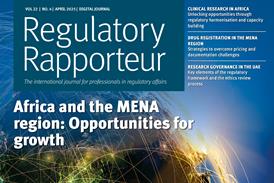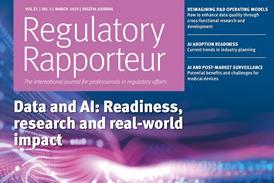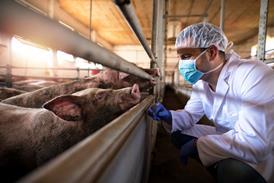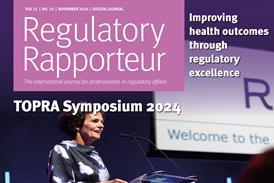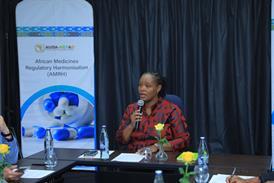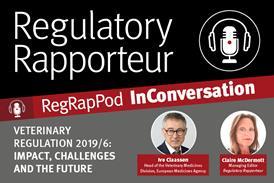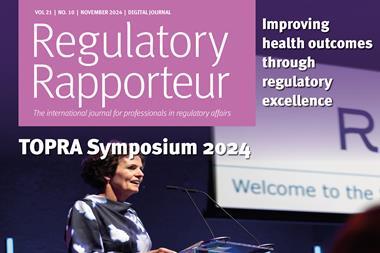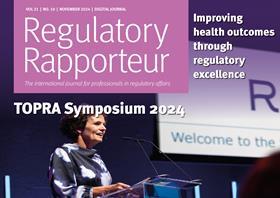
Regulatory Rapporteur
November 2024 | Volume 21 | No. 10
Held annually since 2004, the TOPRA Symposium is Europe’s premier conference for healthcare regulatory affairs, with dedicated programme streams for human medicines, medical devices and IVDs, and veterinary medicines. This year’s TOPRA Symposium was hosted in Rotterdam, the Netherlands, in partnership with the Medicines Evaluation Board, the Netherlands’ national authority of medicines and health products. In addition to hearing the latest insights and developments running over multiple sessions, it also provided valuable opportunities to network and make new contacts.
In this month’s issue of Regulatory Rapporteur, we provide a summary of each session, including the key themes covered, industry updates and thought-provoking discussion points from the speaking panels and the audience.

We started the Human Medicines Symposium sessions with an insightful debate on how to best ensure regulatory excellence throughout the industry. Representatives from the European Medicines Agency (EMA), the Medicines Evaluation Board (MEB), the Heads of Medicines Agencies and industry and patient stakeholders came together to discuss the importance of collaboration, transparency and trust in navigating the complexities of new technologies, global harmonisation and evolving regulatory landscapes. A session followed on the European clinical research ecosystem which brought together the views of regulators, ethics committees, industry and patient organisations to reflect on the current landscape and how to re-establish a faster and more competitive environment that supports patient-centric trials. This year’s Fireside chat focused on regulation and innovation with representatives from the EMA, the US Food and Drug Administration (FDA) and the MEB discussing hot topics such as accelerated pathways, the proposed EU sandbox, real world evidence and the Clinical Trials Information System. Innovation was a key topic which linked all human medicine sessions, with other lively discussions on electronic product information (ePI), clinical evidence generation, the impact of the new EU regulation on health technology assessment, the practical implication of the Clinical Trial Regulation (CTR) and how AI tools will transform regulatory practice.
The Medical Devices and IVDs Symposium streams kicked off with a joint human medicines session on the COMBINE project, which aims to address the challenges of overlapping regulations such as the CTR, the Medical Device Regulation (MDR) and the In Vitro Diagnostic Regulation (IVDR) by analysing regulatory issues and proposing solutions to streamline processes for combined studies. Another session continued the theme of the impact of MDR/IVDR on the future with insights from manufacturers, notified bodies, the Dutch Inspectorate and MedBoard, a medtech regulatory intelligence platform, who all encouraged the need for ongoing flexibility and collaboration to explore solutions. Current and future UK MDR requirements were also discussed in a separate session, including a debate on the interpretation of the new post-market surveillance legislation and expected international recognition requirements. Sessions were also dedicated to the vital role of the Person Responsible for Regulatory Compliance (PRRC) in ensuring compliance, and the impact and nuances of the EU Artificial Intelligence Act on medical devices and its aim to ensure that AI systems are safe, harmonised and implemented ethically.

The Veterinary Medicines Symposium began with an informative session about the One Health quadripartite and its aims to tackle the interconnected challenges of human, animal and environmental health, with delegates hearing perspectives from the Netherlands’ Chief Veterinary Officer, the EMA and the World Organization for Animal Health. Other sessions focused on Regulation (EU) 2019/6 and the challenges of data quality issues in the Union Product Database, packaging and labelling obligations and first experiences of the summary of product characteristics harmonisation procedures. The Regulation has also introduced significant changes to the way pharmacovigilance is performed and a separate session covered first experiences with the new provisions and facilities for veterinary pharmacovigilance, new signal management options, and information on the Data Quality Framework for Adverse Drug Reaction reporting. The presentations concluded with a look at the future of veterinary regulatory affairs, which highlighted the importance of innovation in understanding the effect of medicines for non-food producing animals on the environment, and how tools such as vaccine antigen master files and vaccine platform technology master files are critical in increasing efficiency.
This year’s first parallel session focused on resolving specific development hurdles via scientific advice procedures offered by the EMA, national regulatory agencies and health technology assessment bodies, and the second was on patient experience data and the importance of harmonising data collection methods, using new technology and implementing forthcoming regulatory initiatives in order to aid standardisation. The dedicated SME session this year gave valuable insight into the incentives and tools available to support SMEs, academics and start-ups and provided engaging examples of how to optimise these tools and select the most appropriate regulatory agency to consult with to ensure challenges are minimised.
The 2024 annual lecture was, as ever, a highlight of the Symposium, with Ilona Kickbusch, Founder and Chair of the Global Health Centre, Graduate Institute of International and Development Studies in Geneva, describing the significant shifts in global health and the need to overcome geopolitical divides and collaborate on worldwide initiatives in order to achieve global health equity.
All sessions highlighted the dynamic nature of our industry, and although there are many challenges and uncertainties to overcome, the regulatory landscape continues to advance at pace. To allow this advancement, regulatory professionals must also evolve and events such as the Symposium provide a wonderful platform for this continuing professional development. Please mark your diary for the next year’s TOPRA Symposium, which will be taking place in Berlin between 29 September and 1 October 2025. We look forward to seeing many colleagues there!


